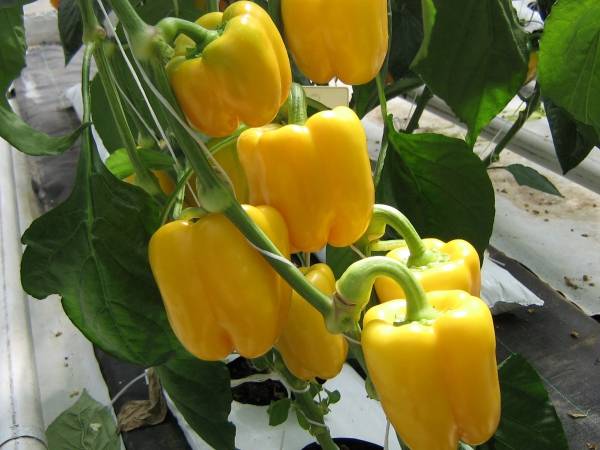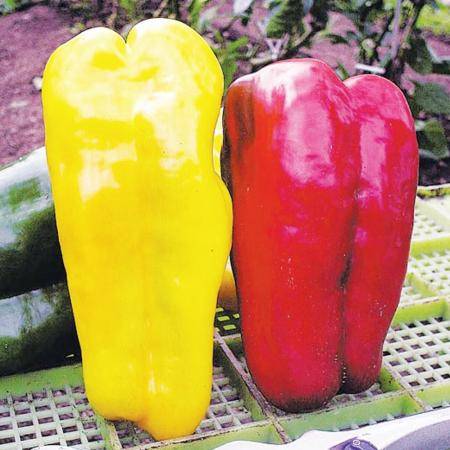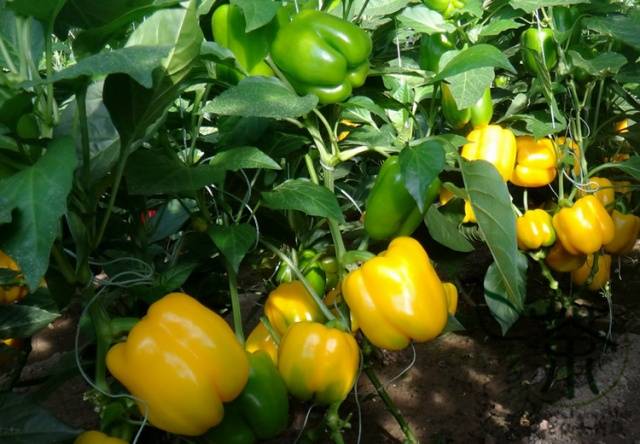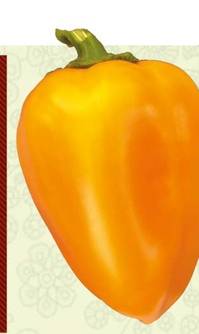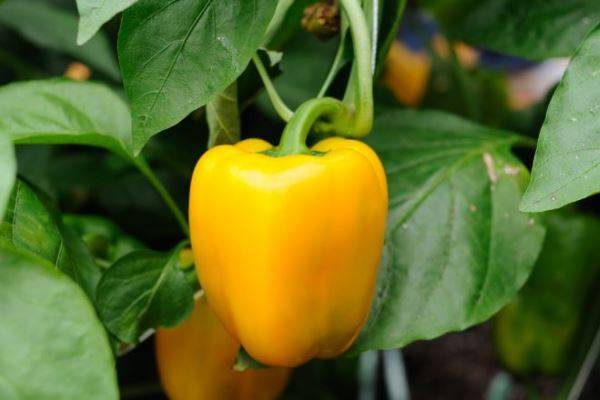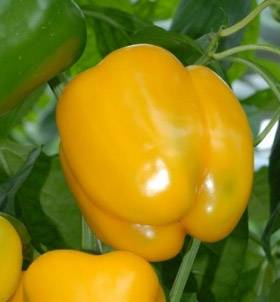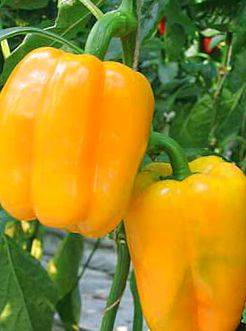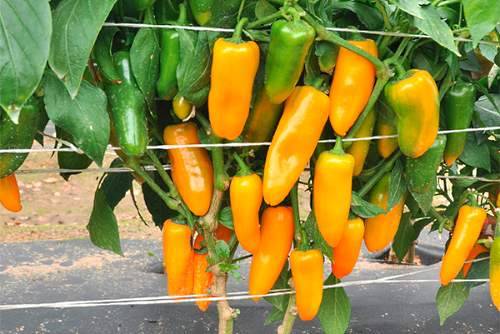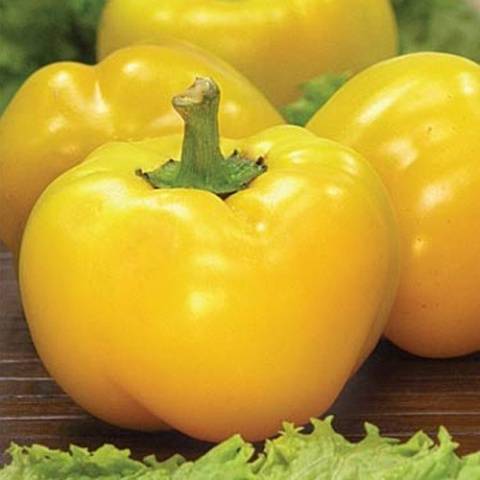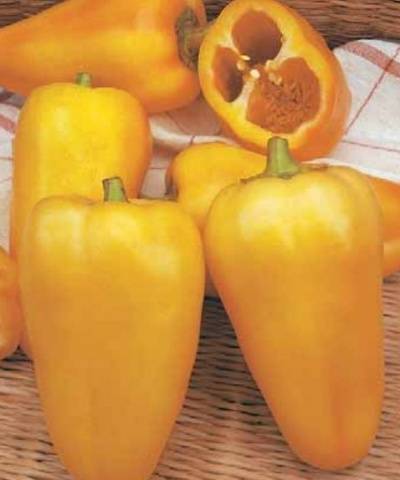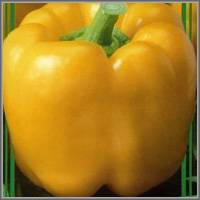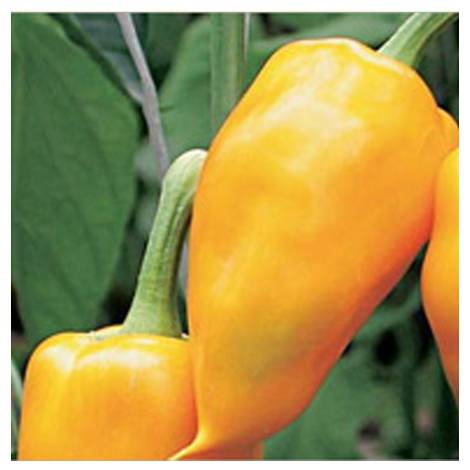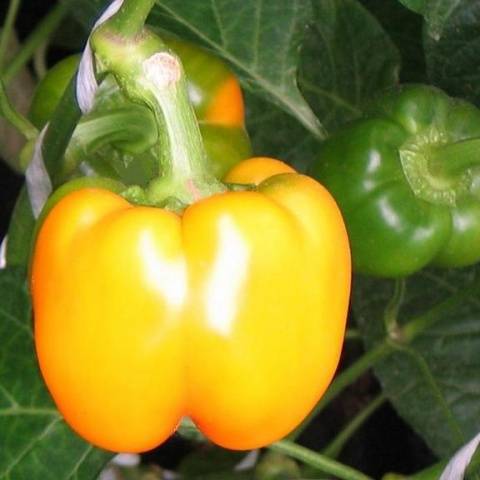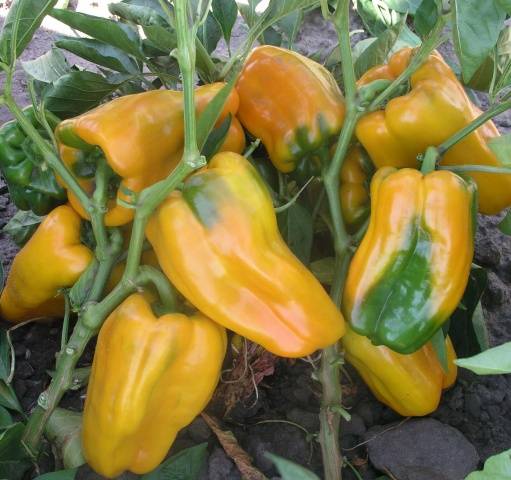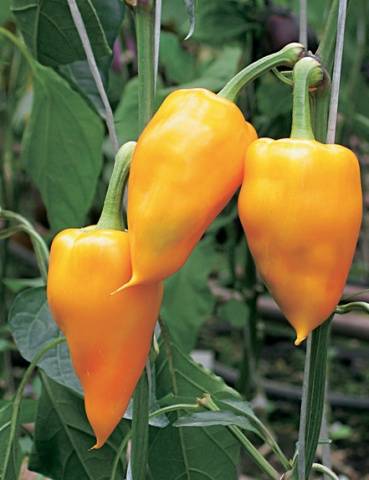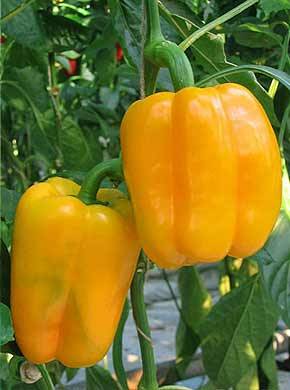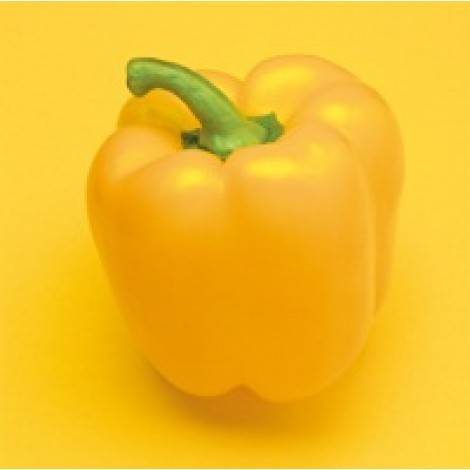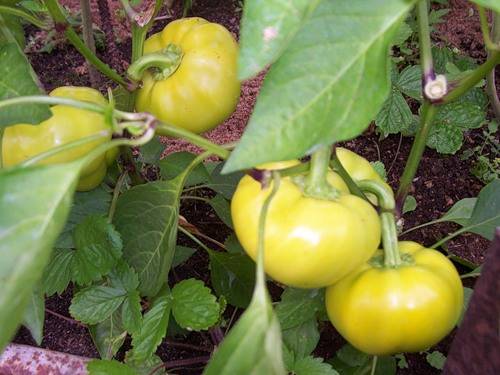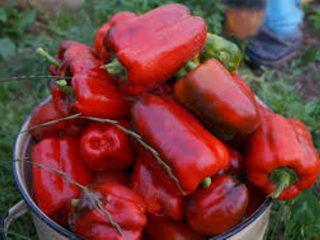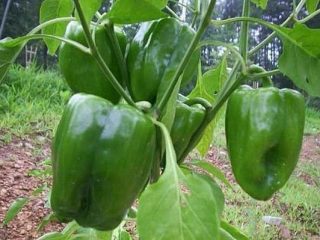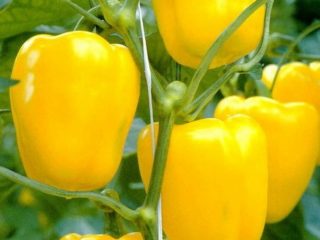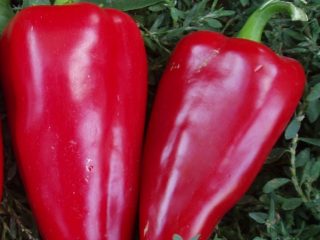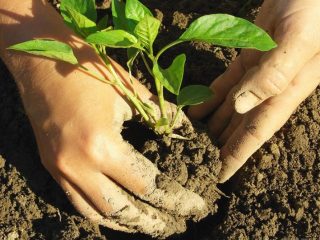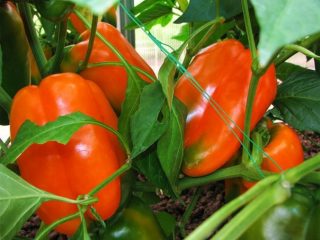Content
- 1 Features of yellow fruits
- 2 Overview of varieties
- 2.1 Yellow bull
- 2.2 Yellow bouquet
- 2.3 Golden swallow
- 2.4 Golden lantern
- 2.5 Yellow bell
- 2.6 Golden
- 2.7 Golden Rain
- 2.8 Golden Jubilee
- 2.9 Oriole
- 2.10 Isabel
- 2.11 Indalo
- 2.12 Katyusha
- 2.13 Bagration
- 2.14 Gemini
- 2.15 Curious
- 2.16 Raisa
- 2.17 Firefly
- 2.18 DiCaprio F1
- 2.19 Catriona F1
- 2.20 Yellow cream
- 2.21 Sun
- 2.22 Yaroslav
- 3 Conclusion
The fruits of bell peppers with yellow flesh are more popular due to their aesthetic side, that is, their magnificent color. The taste of orange and yellow vegetables is nothing special; they are even one step lower than red fruits. But yellow peppers are best used for stuffing and winter preparations. Most often, crops with yellow fruits belong to the middle period of ripening, but late or early varieties can occasionally be found. When choosing seeds, you need to pay attention to the characteristics on the packaging, among which there must be a description of the beginning of fruiting time.
Features of yellow fruits
When choosing the best varieties of crops that produce yellow peppers, you need to become a little familiar with the characteristics of such fruits. Despite the fact that it is inferior in taste to red peppers, the vegetable has fleshy pulp filled with phosphorus and potassium. The calorie content of yellow fruits is 27 kcal/100 g of pulp.
The vegetable contains fiber, pectin, and a large amount of essential oil. The pulp is saturated with vitamins vital for humans.First of all, ascorbic acid, known as vitamin C, helps strengthen the immune system and fight the human body against colds. Vitamin B helps calm the nervous system and strengthens bone tissue. Vitamin PP is very important for people suffering from diabetes, as it lowers blood sugar levels and strengthens blood vessels. You should also add vitamins A, E, iron, calcium and other useful microelements to this list.
The yellow fruits of bell peppers have gained wide popularity in the preparation of various dishes, as well as winter preparations. The vegetable looks beautiful in canned food, various salads, stuffed or simply grilled.
Overview of varieties
It is impossible to determine the best varieties of yellow peppers due to the fact that each vegetable grower grows them for specific purposes. Some people need the vegetable for canning or simply eating it, while others grow it for sale. However, guided by numerous reviews from vegetable growers, we will still try to rank better crop varieties with a brief description and photo.
Yellow bull
A very good variety produces a mid-early harvest large peppers. A traditional cone-shaped vegetable weighing about 200 g can grow up to 20 cm in length. The pulp, 8 mm thick, is highly saturated with sweetish juice. The skin clearly shows 3 or 4 prominent lobes. The crop bears fruit well in cold and heated greenhouses. Only in the first case the yield will be 9 kg/m2, and in the second – 14 kg/m2. The plant has excellent immunity to diseases.
Yellow bouquet
This pepper variety is characterized by medium-early fruit ripening. The first harvest can be harvested after 115 days. The bush is slightly spreading, moderately covered with foliage. When forming, it is necessary to remove side shoots, as well as the lower tier of foliage. The crop is intended for greenhouse cultivation, but in the southern regions it can grow in the open air. The shape of the vegetable is a bit like an elongated rectangle up to 10 cm long. A mature sweet pepper weighs about 150 g. The pulp is of average thickness about 6 mm.
Golden swallow
This variety of yellow pepper for open ground in cold regions is capable of producing a good early harvest under film. The culture has a low, slightly spreading bush. The shape of the peppers resembles hearts with two or three seed chambers. The pulp is very fleshy, 9 mm thick. A mature vegetable weighs approximately 130 g. In a garden with 1 m2 you can collect 1.8 kg of crop, under cover - up to 6 kg of fruit.
Golden lantern
The culture brings an excellent early harvest in the open air and under film cover. Bushes of limited height with a slightly spreading crown are hung with drooping peppers. The heart-shaped vegetable weighs about 110 g and has 2 or 3 seed chambers. The pulp is juicy, fleshy, 9 mm thick. In open beds the yield is 2.8 kg/m2.
Yellow bell
Peppers reach early maturity 75 days after seedling germination. The culture is intended for cultivation in open ground or under film. The bushes grow to a maximum height of 75 cm, which requires partial staking of branches. Ripe peppers take on the shape of a cube with 3 or 4 distinct edges. The pulp is fleshy, juicy, 9 mm thick.
Golden
The variety belongs to the mid-early period of ripening and is intended for greenhouse cultivation. Harvest ripening occurs 125 days after seedling germination. Tall bushes require removal of shoots, as well as tying branches to the trellis. The plant continuously bears fruit, yielding 13 kg of peppers per 1 m2. The meaty, trapezoid-shaped vegetable weighs about 150 g.
Golden Rain
When choosing the best varieties for stuffing, you can choose this crop. Early ripening of peppers occurs 116 days after seedling germination. The variety is intended for greenhouse cultivation and gardening. The bushes grow to a maximum height of 0.8 m and require the removal of the lower tier of foliage, as well as side shoots. Productivity is 2.4 kg/m2. The shape of the pepper resembles a flattened ball with clearly defined ribs. The pulp is juicy, up to 7 mm thick. The vegetable weighs approximately 60 g.
Golden Jubilee
The culture belongs to the average ripening period, bringing a ripe harvest 150 days after germination of seedlings. The bushes are medium, maximum 55 cm in height. Ripe peppers take the shape of a flattened ball with a diameter of about 9 cm. The vegetable weighs 180 g. The pulp is very fleshy, approximately 10 mm thick, and is highly saturated with juice. The yield indicator is 4.5 kg/m2. Peppers are considered to be of universal use.
Oriole
The variety of early ripening yellow peppers was bred by Siberian breeders and is intended for various types of greenhouses, as well as open ground. A mature harvest will be ready after 110 days. The bushes grow up to 0.8 m in height and have slightly spreading branches. The yield is quite high, from 1 m2 you can get about 11 kg of peppers.
Isabel
The variety bears early ripe fruits approximately 100 days after seedling germination. Low-growing bushes with limited length shoots grow to a maximum of 0.6 m in height. The plant is densely covered with barrel-shaped peppercorns 6 cm long and wide. The pulp is thick, highly saturated with juice. The plant bears fruit well in open and closed beds.
Indalo
The medium-early ripening period yields a mature harvest after 120 days. Tall bushes can grow up to 1.2 m in height. Large ripe peppers are shaped like a cube. The pulp is very fleshy, juicy, 10 mm thick. One peppercorn weighs approximately 300 g. The plant is immune to viral diseases. From 1 m2 You can get up to 14 kg of yield when grown in greenhouses.
Katyusha
Fully ripened peppers can be obtained 125 days after seedling germination. The mid-early pepper bush grows about 0.7 m in height, bearing an ovary of four fruits. The plant does not require human participation when forming the crown. Medium-sized peppers weigh about 100 g. The pulp is of medium thickness, approximately 5 mm, covered with a durable, smooth skin. 2 or 3 seed chambers are formed inside the vegetable.
Bagration
The mid-early ripening variety produces a harvest 110 days after the seedlings emerge. The bushes usually grow to a height of 0.8 m, but can stretch higher. To get a good harvest per 1 m2 5 to 8 plants are planted. Cuboid-shaped peppers weigh a maximum of 200 g. The ribs are clearly visible on the fleshy walls 8 mm thick. The purpose of the vegetable is universal.
Gemini
The variety is able to please the owner with early peppers 75 days after planting the seedlings in the ground. Growing can take place in open and closed beds. The plant is distinguished by its powerful bush structure, which holds large peppers weighing about 400 g on its branches. Four seed chambers are formed inside the cube-shaped vegetable. The pulp is thick, highly saturated with juice.
Curious
The first flowers on a plant in the early fruiting period appear at 62 days of age. The ripening of adult peppers is observed 140 days after the seedlings emerge. A bush with a slightly spreading crown grows up to 0.8 m in height. Peppers have a traditional cone shape and a long nose. The fleshy pulp reaches a thickness of 8 mm. The weight of a mature vegetable is about 140 g. The ripening of the crop occurs alternately unfriendly. One bush can form from 20 to 60 peppercorns, which creates a strong load on the branches. The plant quickly gets used to any weather conditions.
Raisa
The greenhouse crop belongs to the varieties of Dutch selection. Peppers ripen early. The bushes are not very leafy and display cube-shaped fruits. The vegetable has thick juicy pulp covered with a smooth skin. Inside the peppercorn, 4 seed chambers are formed. After harvesting, the harvest is perfectly stored without losing its presentation.
Firefly
A mid-early fruit ripening variety produces a harvest 130 days after seedling germination. The culture is intended for greenhouse cultivation. The bushes grow to an average height of less than 1 m, the crown is densely covered with foliage. Recommended at 1 m2 Plant a maximum of 3 plants. Over the entire growing season, the bush will bring about 1.6 kg of harvest. The shape of the peppers resembles a pyramid with a truncated top. Pulp thickness 6 mm.The weight of a mature vegetable is approximately 100 g.
DiCaprio F1
The hybrid produces stable yields under open air and film. The culture belongs to the mid-season varieties. Tall bushes are covered with cube-shaped peppers. The weight of a mature vegetable is approximately 150 g. 3 or 4 seed chambers are formed inside. The juicy pulp, 6 mm thick, is covered with a smooth, dense skin. In a warm region in the garden, the hybrid will bring about 4.2 kg of harvest.
Catriona F1
This hybrid is intended for growing in open and closed beds. Bushes of medium height in warm regions from the garden bring 4.2 kg of harvest. Ripe cube-shaped peppers form 4 seed chambers. The juicy pulp, 6 mm thick, is covered with a smooth, slightly matte skin. The weight of one peppercorn is approximately 140 g.
Yellow cream
A very early variety is more related to decorative peppers. A tall plant grows up to 1 m in height. The bush has a slightly spreading crown, densely covered with small peppers. The weight of one ripe vegetable is only 20 g. The shape of the fruit resembles small, slightly elongated balls or cream.
Sun
Peppers are of medium ripening time. The bushes are low-growing, maximum 50 cm in height with a neatly formed crown. The spherical peppers do not form ribs on the walls. The pulp is 8 mm thick and covered with a smooth skin. The weight of a mature vegetable is about 100 g. The fruits are considered to have a universal purpose.
Yaroslav
A variety with mid-early fruit ripening yields a harvest 125 days after germination. Seedlings are planted at sixty days of age with a maximum of 3 plants per 1 m2. The spherical, slightly flattened peppers weigh approximately 85 g. The flesh is juicy, up to 5 mm thick. The plant produces a good harvest. From 1 m2 you can collect up to 6 kg of peppers. Even after processing, the pulp retains its peppery taste.
Conclusion
The video shows yellow peppers:
After reading the descriptions and photos of many varieties, a novice vegetable grower will be able to choose a yellow bell pepper with suitable characteristics. If you follow agricultural technology, you will be able to grow a good harvest at home.
